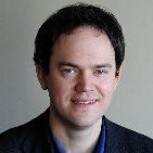
Professor
Academic Division: Information Engineering (Head of Division)
Research group: Signal Processing and Communications
Telephone: +44 1223 3 32604
Email: sjg@eng.cam.ac.uk
Research interests
Professor Godsill's research interests include:
Bayesian Computational Methods for Signal Processing - Underpinning much of the above applications work is the Bayesian paradigm and associated algorithms for inference about the parameters and structure of complex systems. In the Bayesian approach data is combined with any prior information available in an optimal fashion using probability distributions. We are particularly concerned with the development of new methods appropriate to the applications above. These applications are often sequential in nature (the data arrive one-by-one and a decision/estimate is required with small or no delay), hence we focus considerable attention on sequential learning methods such as Sequential Monte Carlo (particle filtering). Other problems are batch in nature (the data arrive all at once, or we can wait until all of the data have arrived before processing) - in those cases batch algorithms can be used, and we focus attention on stochastic simulation methods such as Markov chain Monte Carlo (MCMC), including those for model uncertainty problems (reversible jump MCMC, etc.). Novel techniques are developed to help tailor these methods to the applications at hand.
Audio and Music Processing (AMP) - The Signal Processing Laboratory has had long involvement in audio and music processing. Early work in sound restoration here in the 1980's led to the founding of the successful company CEDAR Audio Ltd. which produces DSP equipment for remastering and enhancement of sound in the recording, broadcast and forensic industries. In current research we are concerned with accurate modelling of digital audio and automated inference about the parameters and structure of those models. Research interests include computer music transcription, audio source separation, musical beat-tracking, chord recognition, Digital Audio Restoration, noise reduction, multichannel audio and sparse modelling with overcomplete dictionaries of atoms. Underpinning much of the work is a Bayesian statistical modelling approach to audio problems.
Tracking Algorithms - A major challenge in many application areas is that of detection, classification and tracking of multiple objects. Classic applications of this include radar and sonar, but the principles extend into computer vision, robotics and many other areas. We are aiming to push back the boundaries of current technology where we may wish to infer object linkages (group/network objects), intentionalities and other higher level concepts from many heterogeneous data sources. The methods devised use novel implementations of Monte Carlo Bayesian updating (e.g. particle filtering) to carry out joint detection of number, characteristics and position of objects in cluttered environments.
Strategic themes
Bioengineering
Research in brain connectivity learning from MEG/EEG data.
Complex, resilient and intelligent systems
All of my research projects are relevant to this theme.
Research projects
Current research projects with EPSRC, Google Chrome, Selex Galileo, JLR. Past projects with EPSRC, EU. Mastercard, Citigroup, QinetiQ, General Dynamics, Olivetti Research.
Teaching activity
- 3F3 Signal and Pattern processing
- IB Paper 6: Signal and Data Analysis
Research opportunities
Post-doctoral positions available, including multi-frequency segmentation of SAR imagery.
Other positions
Fellow of Corpus Christi College, Director CEDAR Audio Ltd.
Biography
Simon Godsill is Professor of Statistical Signal Processing in the Engineering Department at Cambridge University. He is also a Professorial Fellow and tutor at Corpus Christi College Cambridge. He coordinates an active research group in Signal Inference and its Applications within the Signal Processing and Communications Laboratory at Cambridge, specializing in Bayesian computational methodology, multiple object tracking, audio and music processing, and financial time series modeling. A particular methodological theme over recent years has been the development of novel techniques for optimal Bayesian filtering and smoothing, using Sequential Monte Carlo or Particle Filtering methods. Prof. Godsill has published extensively in journals, books and international conference proceedings, and has given a number of high profile invited and plenary addresses at conferences such as the Valencia conference on Bayesian Statistics, the IEEE Statistical Signal Processing Workshop and the Conference on Bayesian Inference for Stochasrtic Processes (BISP). He co-authored a seminal Springer text Digital Audio Restoration with Prof. Peter Rayner in 1998. He was technical chair of the successful IEEE NSSPW workshop in 2006 on sequential and nonlinear filtering methods, and has been on the conference panel for numerous other conferences/workshops. Prof. Godsill has served as Associate Editor for IEEE Tr. Signal Processing and the journal Bayesian Analysis. He was Theme Leader in Tracking and Reasoning over Time for the UK’s Data and Information Fusion Defence Technology Centre (DIF-DTC) and Principal Investigator on many grants funded by the EU, EPSRC, QinetiQ, General Dynamics, MOD, Microsoft UK, Citibank and Mastercard. In 2009-10 he was co-organiser of an 18 month research program in Sequential Monte Carlo Methods at the SAMSI Institute in North Carolina. He is a Director of CEDAR Audio Ltd. (which has received numerous accolades over the years, including a technical Oscar).
